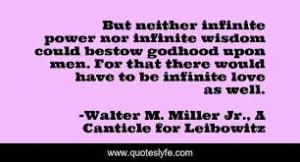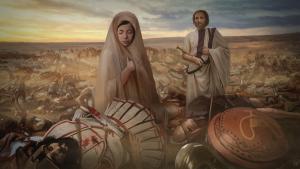On David Tracy’s Fragments, Chapter 5, “Metaphysics, Theology, and Mysticism”

How do I write about our infinite God? Besides being only finite, my mind has an extra problem – I don’t like infinity. I remember learning that scientists found the universe wasn’t infinite. I realized then that I liked the world better that way. What’s to like about an infinite world, anyway. It’s not a place to feel at home in. As soon as I learned that the scientific world is not infinite, I also saw that I could think of the whole universe as comfortably small.
Fans of modern science often think people in the Middle Ages imagined a small cosmos surrounding a large, and very important, earth. Actually, the Medieval picture was about the opposite of that. The cosmos was huge, with seven angelic spheres and God’s realm beyond that. Earth in the middle was a dot by comparison, not cosmically important compared to the angels’ homes. (But God may have loved Earth and her inhabitants best.) The whole cosmos was finite, like our universe. More than science’s world, it was a place you could feel at home in. Many, though not all, theologians believed that even God was not infinite.
But David Tracy says the Infinite is God’s “most appropriate” name, a name that “pervades all [the other] names” for God. (p. 47) The Bible says, “God is love.” It doesn’t say “infinite love,” but Pope Francis does in his latest encyclical. I have to think again about our infinite God.
Infinite power?
Infinity makes me think about size, length of time, and, especially, power. Just expand these measurable things ad infinitum. As for size, I don’t think of God as having any. Infinite duration isn’t quite right for God, either. God is eternal, outside of time, rather than progressing through infinite time. But power is a different story. Power fascinates. It fascinated the Bible’s authors. In Bible stories kingdoms and the forces of nature all bow to the divine will. Imagining God’s power is like taking all we know about power, on earth, in the sky, or in human hands, and enlarging it to an infinite degree.
As I think about God’s infinity, I want, first, to test this infinite power idea. People so readily imagine power is the key to solving every problem. No matter the issue or the venue, power is always there, ready to keep a conflict going. I prefer not to let that human fixture color my thoughts about God.
The oldest story in the world and the Bible
A story older than the Bible, perhaps the world’s oldest story, dates from before 1750 BCE. It tells about powerful gods in the religious imaginings of Israel’s neighbors. The Bible writers knew this story:
The “Enuma Elish,” the Mesopotamian creation myth, details the birth of the gods Apsu and Tiamat from swirling, chaotic waters. Their union produces the younger gods. Apsu, however, decides to kill the annoying younger gods. Tiamat warns her oldest son, Enki, who kills Apsu. Now Tiamat is upset, not so logically, at the loss of her mate and makes war on her children. Marduk emerges as champion of the otherwise hapless younger gods. He kills Tiamat and out of her corpse creates the heavens and the earth.
From the swirling waters to the creation of heaven and earth, this story is saturated with power and gods who use power against each other. But Israel told a story of a divinity even more impressive. Genesis tells how Yahweh created the heavens and the earth. There is the same initial swirling watery chaos. But in Israel’s story God creates without any struggle, by a mere word – “Let there be.” I used to imagine that this divine power so far surpassed that of the other gods that what was a struggle for them was a cinch for Israel’s God. How could such divine power be less than infinite? But also, How could belief in such a God not justify and encourage our fascination with power?
Another side of God
I remember my young fascination with the new, immensely powerful nuclear weapons of the 1950’s. Speed also, as in faster than sound jets and rockets soaring into space, fascinated me. In high school seminary religion classes, creation ex nihilo elicited the same feelings. A teacher said there’s an infinite distance between nothing and something, so creation must have required infinite power.
Well, my early fascination with H-bombs has turned to a more mature and reasonable fright. I learned to prefer speed on a more human scale like running races and sliding down snowy hillsides. I no longer believe “nothing” is infinitely distant from “something.” Zero and, say, a million and 70 are not infinitely far apart. As for creation, I remembered that in Genesis God simply speaks: “Let there be … and so it happened.” It doesn’t sound like a use of infinite power or any power at all.
Creation didn’t start with nothing (symbolized by chaos in the old stories) that needed to be turned into something. God started with God’s own self. Creation is a gift, even a sacrificial gift, out of God’s fullness. (It’s an echo of the Father’s gift of himself to the Son, but that Trinitarian speculation is another large topic.) I don’t think it’s wrong to think of creation and sacrifice together or even to say that God the Father was, in some way, making a sacrifice. After all, Jesus, by his sacrificial life and death, showed us what the Father is like.
Sacrificing what God otherwise might have been, God creates a world and takes on new relationships, new loves, new commitments (new problems?). God doesn’t become by this sacrifice anything less than infinitely perfect, just different.
Infinitely perfect?
Tracy uses the phrase “infinitely perfect” of God. But what could that mean? How do the two words fit together? We think of infinity as open ended. There are no edges and nothing to hem it in. But perfection signifies completeness. There’s no adding to it or changing it. It’s already finished off—perfect.
Tracy, I think, reveals what most motivates him throughout Fragments in an early paragraph in this chapter on infinity. He contrasts the Christian God with some other conceptions of Absolute, Ultimate Reality:
Unlike some understandings of … the Ultimate, the Absolute, the category Infinite does not close into an encompassing totality…. The true Absolute Infinite is always infinitely open as well as internally related to all other reality, which the Absolute often is not (e.g., as understood by Hegel). (p. 94)
And throughout Fragments Tracy intends to “shatter, fragment, negate any closed totality system.” (p. 1) Perfection, if there is such a thing, must leave room for something new. Progress is one of the idols the modern Western world worships. But take away the idolatry and you still have something good, something that the ancient, static worldview was missing. Change can be a positive thing. Growth is one quality of perfection. I imagine the divine play of love of the Father and the Son in the Holy Spirit as an exchange that keeps growing in its eternal back-and-forth. After all, human love grows when it is returned. I think we’ll find, when we get there, that heaven is more dynamic than the traditional phrase “beatific vision” connotes.
Infinite love
Tracy says the infinite “pervades all [the other] names” for God. So, if power is a name for God, then God’s power must be infinite. With infinite power a super-being could move with infinite velocity. That would reduce the time for getting from point A to point B to zero. You’d be in both places and all the places between simultaneously. That doesn’t sound like movement at all. We say God is present everywhere, but it’s not because God moves so fast. The idea of infinite power brings up other conundrums. Foremost of these is the problem of theodicy. If God is both infinitely powerful and infinitely good, then God should have made a world without undeserved suffering. (See this post for my attempt at theodicy, my defense of God on the issue of suffering.)
“God is love.” The Bible nowhere says “God is power.” We speak of the power of love, but that’s not power in any literal sense. The Creed speaks of God’s almighty power, and that theme is strong in the Bible. But “all powerful” is not the same as “infinitely powerful.” All power is God’s power, but all the power in a finite world does not add up to infinity.
This attempt to think about our infinite God, with the help of Tracy’s book Fragments, Chapter 5, will continue in another post. I’m still trying to understand, or at least like God’s infinity. Maybe infinite Love will make more sense than infinite power. Or infinite Goodness or infinite Beauty. It will be a challenge to try to apply infinity to things we can’t measure.
Image credit: QuotesLyfe











